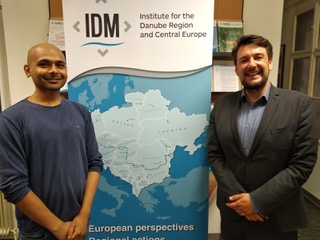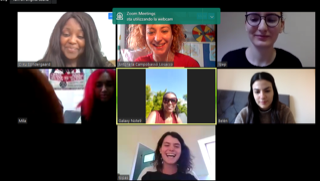06 Nov EU4EU Internships and COVID-19: what you need to know

Summary of the sending country’s rules for the EU4EU Mobilities during the COVID-19 pandemic.
The Covid 19 pandemic has taught us that it was not necessary to interrupt all the activities, in the work, educational, social or recreational fields for which we previously considered physical presence essential. With willpower, a little patience and a basic use of technology, we have been able to do many of them at a distance, albeit in a different and challenging way.
Although the internship experience abroad is apparently difficult to coincide with the COVID-19 pandemic, even Erasmus+ mobilities in 2020 did not stop. Many Erasmus + internships have taken place and are taking place remotely, allowing students to continue their learning experiences in these difficult times. All this also applies to the Erasmus + EU4EU internships: in 2020, more than a hundred students engaged in their internships with the EU4EU program with positive results. We have interviewed some of them for you.
To date, the European Commission does not plan to interrupt the mobilities for this academic year, but rather, to adapt to the new restrictions and needs of social distancing. It proposes new ways of carrying out internships, giving everyone the opportunity to have a positive Erasmus+ experience.
The Erasmus Agency has added two specific methods of carrying out the internship to the classic way of carrying out the internship in person, which in any case continues within the limits allowed by the country of destination and the possibilities of the Host Organization. These methods are therefore approved and encouraged by the sending University of the student.
- Remote internships: Internships carried out entirely remotely
- Blended internships: Internships carried out partly remotely and partly in presence, when the security and logistical codes allow it.
For the internship in blended mode, the payment of the Erasmus + scholarship is regulated according to different rules depending on the country of the sending university.
For the internship in blended mode, the payment of the Erasmus + scholarship is regulated according to different rules depending on the country of the sending university. Internships carried out entirely remotely are admissible only in the case of “force majeure” linked to Covid 19, eligibility decided by the Erasmus Agency at national level based on the situation in each country at the time the internship takes place. In any case, according to the Erasmus Agency the trainee that carries out the internship remotely from home is not entitled to a scholarship, assuming that in this case the student does not have to bear the expenses related to mobility abroad. If, on the other hand, the student goes abroad in the Country of the Host Organization despite having to work remotely, will be entitled to a scholarship.
While the need to stay safe at home can easily justify an attitude of laziness and passivity, many students in Europe are instead engaged relentlessly in finding new opportunities to build their future. Some of them, within the limits of safety, have not stopped traveling during 2020 to join the team of a company in Europe, or are working remotely, taking advantage of the technology and the time available to learn, improve their English and add new experience and skills to their professional profile.
To demonstrate that Covid has not cracked the ardor and willpower of the students, we can give this data: on October 30, 2020 the deadline for students to register for the new EU4EU call to carry out the internship in 2021 has expired and the complete applications received are more than a thousand, an even higher number than the applications received in previous years, constantly growing, despite the pandemic.
From the EU4EU team, we decided to interview some of the students engaged in their internship experiences in presence, blended or remotely during the COVID-19 pandemic, to offer direct testimonies of their experiences and to give voice to their enthusiasm and determination.

Babrik and his tutor, Sebastian Schäffer, in the Institute of the Danube Region and Central Europe’s office, after the lockdown/ Picture: Babrik Kushwaha
Babrik Kushwaha carried out his internship in the Institute of the Danube Region and Central Europe, in Vienna. “I arrived in March, and 10 days after I got there, the lockdown started,” he explains. “I went to the office for over a week, which was enough for me to get to know the people and starting get familiar with the work which later helped me during the lockdown” he says. “Working from home was not a big problem, I was working on policy papers, helping with the newsletter, writing emails, follow up, etc., which are things that can easily be done remotely”. After the lockdown was over, Babrik still had three months left of his internship, and during that time, he was able to go to the office, “in which we all had our space, so it was safe”.
“I was home for two months during the lockdown, and when I was free from my tasks I used my time to learn other things like how to edit videos” he mentions, “I gained a lot during the lockdown, I didn’t lose anything, it was a learning process”.
In general, he describes the experience as very positive: “I learned a lot, being abroad might seem difficult sometimes but the perk is that we get to learn a lot more”, he says, “the opportunity is amazing, and despite the pandemic, it was worth it, I gained a lot and I’m very happy to have gone to Vienna”, he concludes.
Mónica Herrero is a Spanish student still doing her internship at Katrium OÜ, in Tallinn, Estonia, when we interviewed her. “Even though many of the flights to Tallinn were cancelled in July, I could get there and enjoy the city and the whole experience”, she explains. When the COVID-19 pandemic started, she kept in contact with her Host Organization, who told her they were available to host her during the whole year, “so I was able to choose the most convenient dates for me”, she says. Moreover, she organized her trip to be able to start working at the office as soon as possible: “I chose to arrive earlier to Estonia so I could do my two-weeks quarantine and then start my internship at the office in due time”, she says. Mónica also explains how well her Host Organization assisted her: “My tutors have always been there for me”, she adds, “I had many questions at the beginning and they helped me with everything”.

Antonella and her colleagues during one of the weekly meetings at 4Wings/Picture: Lize Prendushi
Lastly, we have the experience of Antonella Campobasso, an Italian student who did her 4 months internship at 4Wing, a British organization set in Liverpool. She explains that when she arrived she had a cultural shock, because “at the beginning, people in the UK were not taking the pandemic seriously and the restrictions were not as serious as in Italy”, she says. Even though she could have stayed in Liverpool, she decided to go back to Italy after only 20 days, when the situation got worse, and work in blended mobility for the rest of her traineeship. Her Host Organization only stopped their activities for one week, and “when I got back, they allowed me one week off to get settled again”, she says. After that, “they continued with most of their activities, which helped me and my mental balance during lockdown”, she explains, “they organized zoom meetings once a week and we had an excel sheet in which we wrote every task we were doing, to not lose the rhythm”. She also highlights the paper of her tutor: “She is amazing, no one could predict what would happen, but she’s always had an open communication”, and when in the UK the cases were getting worse, “she immediately closed the office and recommended everyone to avoid going out”. Overall, she describes this experience as positive: “I’ve had the chance to learn a lot of skills and I believe I’ve become a stronger person. In fact, I’ve applied for the second call of the EU4EU program, fingers crossed!”
These are just a few of the students we’ve talked with, stay tuned for more experiences in our blog!




